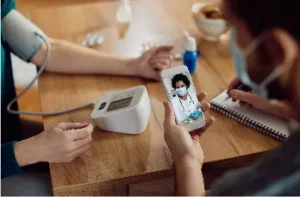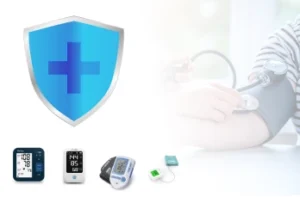
Telehealth Through Time – The Evolving History Of Telehealth
Telehealth Through Time – The Evolving History Of Telehealth Many assume the telehealth revolution was born out of the COVID-19 pandemic, a forced adaptation to

Witnessing a family member or friend’s age can be an emotionally charged experience. As the hands of time move forward, some of our loved ones may face serious health challenges, rendering them unable to lead an independent life. Naturally, as their caretakers or children, your utmost priority is ensuring they receive optimal care.
One term frequently surfaces in conversations about eldercare is “skilled nursing care.” Yet, many remain unaware of what exactly this entails and what qualifies a patient for skilled nursing care. Dive with us into this informative guide; by the end, you’ll have a comprehensive understanding of skilled nursing care and its significance.
Skilled nursing care stands out as a distinct and crucial service specifically designed for those grappling with complex health conditions. Administered by licensed nurses, this specialized care is meticulously orchestrated under the vigilant eye of a qualified physician. Such care delves deep into addressing multifaceted health challenges that necessitate rigorous medical attention over an extended or specific duration.
Here’s where one can typically expect to find skilled nursing services:

Hospitals: These primary healthcare facilities house specialized departments where patients receive focused and intensive skilled nursing care.
Nursing Homes: Often considered sanctuaries for long-term care, nursing homes offer both medical and rehabilitative services, and skilled nursing plays an integral role here.
Assisted Living Facilities (ALF): While primarily for residents who need assistance with daily activities, ALFs also provide skilled nursing care for those with more pronounced medical needs.
Licensed Practical Nurses (LPN): LPNs form the backbone of nursing care in various settings, delivering hands-on care and medical procedures as mandated by the patient’s health condition.
Patients enrolled in skilled nursing care receive uninterrupted treatment, ensuring they are on a progressive path to recovery. Whether it’s recuperating from an injury or managing ongoing health conditions, there’s a provision for both short-term and long-term treatment strategies.
Home health services are another important component of eldercare, and while the two may appear strikingly similar, there’s a distinct difference between them. Home health services typically involve care provided under the direction of a physician and administered by trained personnel (such as nurses, physical therapists, and other healthcare professionals). This type of care is intended for short-term needs that don’t require 24/7 attention.
In contrast, Skilled Nursing Facilities (SNF) provide around-the-clock care for patients with more complex medical needs requiring intense monitoring and oversight. Such facilities are usually equipped with modern tools and equipment that help assess a patient’s condition accurately and administer the necessary treatments quickly. SNFs also feature specialized staff members who have years of experience in elder care and offer personalized attention to elderly patients.
Skilled nursing services, while diverse, have a central goal: to aid in the recovery and well-being of patients, whether they’re recovering back from an injury, dealing with an illness, or managing long-term conditions.
Imagine someone you know has recently had a stroke. Following initial treatments, they’ll likely need intensive, specialized care to make a full recovery. That’s where skilled nursing comes into play. Let’s delve into some of the core services provided:
Physical Therapy: Think of this as the gym for the body’s recovery. It aims to strengthen mobility, enhance strength, and expedite healing processes. Through customized exercises and techniques, patients are empowered to move better and feel better.
Occupational Therapy: Beyond mere physical health, there’s the everyday life we all need to cruise with. Occupational therapy is designed to help patients master daily tasks, ensuring they can live independently and confidently. Whether it’s preparing a meal, dressing up, or organizing their space, this therapy equips them to get back to routine with grace.
Speech Therapy: Communication is fundamental. For those who, due to conditions like a stroke, find it challenging to articulate thoughts or even swallow, speech therapy becomes vital. It helps them rediscover their voice, ensuring they can express themselves clearly and connect with the world around them.
When it comes to healthcare, every patient’s journey and needs are unique. Skilled nursing care, known for its intensive medical focus, often emerges as a pivotal care pathway for those looking for extensive treatment options for the aftermath of surgeries, injuries, or managing chronic ailments.
To findwhether one is eligible for such specialized care, a deep understanding of the qualifying criteria is paramount. Generally, a patient’s admission into skilled nursing care hinges on these pivotal indicators:

Round-the-Clock, High-Frequency Services: There are moments when a patient’s health landscape demands unwavering, 24/7 medical vigilance. This constant attention go beyond the boundaries of what traditional home health services can provide, accompanying the need for the expertise and dedication of skilled nursing personnel.
Expertise of Nursing or Therapeutic Professionals: Skilled nursing isn’t just a title—it’s a testament to the rigorous training and years of experience that these professionals bring to the table. Certain medical interventions, from specialized wound care to intricate physical therapy, necessitate the skilled hands and discerning eyes of seasoned professionals.
Consistent Weekly Oversight: Imagine a framework where a patient’s health is not just treated but mapped with attention. With some patients seeking daily therapeutic or medical interventions, a weekly review becomes crucial. This periodic monitoring ensures the treatment remains aligned with the patient’s evolving health needs, guaranteeing care that’s both tailored and timely.
It’s pivotal to understand that the path to skilled nursing care isn’t one-size-fits-all. Each patient’s journey is a tapestry of unique medical narratives and needs. A thorough assessment, paired with the indicators mentioned above, provides clarity, ensuring patients find their way to the most apt care setting for their journey towards wellness.
Medicare Part A helps pay for care in a place called a Skilled Nursing Facility (or SNF for short). Let’s break down how it works and what it covers:
Medicare can cover up to 100 days in an SNF. This 100-day count starts when you first enter the SNF. If you don’t need any skilled care for 60 days in a row, this 100-day count stops.
Here are the main things:
Semi-Private Room: This is a room you might share with another person.
Meals: The food you eat while you’re in the SNF.
Ambulance: If you need to be moved and it’s a medical need, Medicare can help cover the cost of an ambulance.
Therapies: Medicare covers some therapies like Physical Therapy (PT), Occupational Therapy (OT), and Speech Therapy (ST).
Social Medical Help: This is help you might get to deal with social or personal problems tied to your health.
Medications: Some of the medicines you might need while in the SNF.
Counseling: This is talking to someone who can help with your feelings or worries.
Skilled nursing services provide a valuable resource to those in need of intensive medical care and oversight. Whether it’s short-term or long-term, there are several types of skilled nursing care available. Medicare Part A covers many costs associated with SNF care, while other insurance providers may also pick up the tab. Ultimately, selecting the right type of care for each individual is key to ensuring they get the best possible outcome.
For those in need of skilled nursing care, it’s important to seek out a provider that can understand their specific needs and provide personalized attention. Working with a knowledgeable team of professionals will help ensure the patient gets the most effective level of care available

Telehealth Through Time – The Evolving History Of Telehealth Many assume the telehealth revolution was born out of the COVID-19 pandemic, a forced adaptation to

Reliability of Wearables: Safety Concerns & Security Issues Wearables are the latest tech trend that has taken the world by storm. They enable us to
Talk to an Expert Now